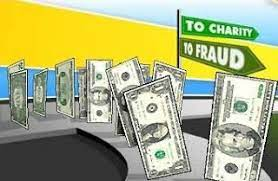
Charity fraud is a form of scamming that preys on people’s goodwill and compassion to steal money from many charities. It can take many forms, such as using a fake charity phone number or person or name or a person pretending to be an actual, registered charity name phone number, organization, or person to solicit donations. Charity fraud can harm both the victims of the scam and the legitimate charities working hard to impact society positively.
In this web article, we aim to provide an in-depth analysis of charity scams and money-back fraud scams and offer practical tips on protecting yourself from falling victim to these charity scams and money-back scams again. We will cover the following topics:
- What is Charity Fraud?
- Types of Charity Fraud
- How Charity Fraud Works
- Warning Signs of Charity Fraud
- How to Protect Yourself from Charity Fraud
- Reporting Charity Fraud
- Conclusion
What is Charity Fraud?
Charity fraud is a scam where fraudsters use deceptive practices to solicit cash donations from unsuspecting individuals and charitable organizations. They often use the mail, fake charity names, or pose as representatives of legitimate charities to gain people’s trust and solicit cash donations. Charity fraud is a severe crime that can cause financial harm to individuals, organizations, and legitimate charities.
Types of Charity Fraud
There are several types of charity and cash donation fraud, including:
- Fake Charities: These charities do not exist or are not registered with the relevant authorities. Fraudsters create fake charities to scam people out of their money.
- Copycat Charities: These charities have a similar name or logo to a legitimate charity. Fraudsters use this tactic to confuse people and solicit donations.
- High-Pressure Tactics: Some fraudsters use high-pressure tactics to force people into donating money. They may threaten to report people to the authorities or use emotional blackmail to coerce donations.
- Online Scams: Fraudsters use the internet to solicit donations from people. They may use fake websites or social media accounts to promote their fake charities and solicit donations.
How Charity Fraud Works
Charity scammers and fraudsters claim to use a variety of tactics to solicit donations from unsuspecting organizations and individuals online. Some of the common tactics that charity scammers will say they claim to use to accept donations online include:
- Telephone Solicitation: Fraudsters call people and ask for donations to a fake charity. They may use high-pressure tactics to coerce people into donating money.
- Door-to-Door Solicitation: Fraudsters may knock on people’s doors and ask for donations to a fake charity. They may use emotional appeals or high-pressure tactics to solicit donations.
- Fake Websites: Fraudsters create phony charity websites to solicit donations. They may use logos or branding similar to a legitimate charity to trick people into thinking they are donating to an actual charity.
- Social Media Scams: Fraudsters use social media to solicit donations to fake charities. They may use emotional appeals or sensational stories to encourage people to donate.
Warning Signs of Charity Fraud
There are several warning signs for victims of charity and mail fraud scams that you should be aware of, including:
- High-Pressure Tactics: Legitimate charities do not use high-pressure tactics to solicit donations. It may be a scam if someone pressures you to donate money.
- Suspicious Websites: If a website looks suspicious or does not have a secure connection, it may be a fake charity website.
- Unsolicited Phone Calls or Emails: If someone calls or emails you out of the blue asking for a donation, it may be a scam.
- Lack of Transparency: Legitimate charities are transparent about their finances and how they use donations. It may be a scam if a charity is unwilling to provide information about how they use gifts or where the money goes.
- Similar Names: Fraudsters may use names similar to legitimate charities to trick people into thinking they are donating to a real charity.
How to Protect Yourself from Charity Fraud
To protect money, pay for yourself, donate money, and raise money from victims of charity fraud scams, you should follow these tips:
- Research Charities: Before donating to a charity, research it thoroughly. Check if it is registered with the relevant authorities and has a good reputation.
- Verify Information: If someone calls or emails you are asking for a donation, verify their information before donating. For example, check if they are from a legitimate charity and if the charity is registered with the relevant authorities.
- Use Secure Websites: If you donate online, ensure the website is secure. For example, look for the lock icon in the address bar and check if the website address starts with “https.”
- Don’t Give Personal Information: Never give out your personal information, such as your social security number or bank account information, to a charity you are unfamiliar with.
- Be Wary of High-Pressure Tactics: It may be a scam if someone pressures you to donate money. Legitimate charities do not use high-pressure tactics to solicit donations.
Reporting Charity Fraud
If you suspect charity fraud, you should report it immediately. You can report it to the Federal Trade Commission (FTC) or contact your state’s Attorney General’s Office. You can also report it to the Better Business Bureau (BBB) or contact the charity scam watchdog organization Charity Navigator.
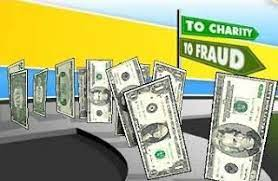
Our Commitment to Preventing Charity Fraud
As a responsible and reputable charitable organization, we take charity fraud seriously. We understand the importance of ensuring that our donor organizations’ contributions and money are donated to legitimate and deserving charities, organizations, and organizations that positively impact society. Therefore, we have implemented many strict policies and procedures to prevent charity fraud and protect our donor organizations’ money.
Here are some of the measures we have put in place:
- Thorough Verification: We conduct a rigorous verification process before recommending a charity to our donors. We research the charity’s background, financial information, and reputation to ensure it is legitimate and trustworthy.
- Ongoing Monitoring: We continuously monitor the charities we recommend to our donors to ensure they use donations effectively and transparently. We also keep track of any complaints or negative feedback about the charities and take appropriate action if necessary.
- Secure Donation Platform: Our donation platform is secure and uses industry-standard encryption to protect donors’ personal and financial information. We also use secured payment gateways to process donations and ensure they go directly to the intended charity.
- Transparent Reporting: We provide regular reports to our donors about the charities they have supported, including information about how their donations have been used and the impact they have made. We also provide financial reports to show how donations are used and ensure transparency.
- Expert Guidance: Our team of experts is always available to guide and advise our donors on choosing the right charities and avoiding charity fraud. We also offer educational resources and training to help donors become more informed and empowered when making charitable donations.
In conclusion, we are committed to preventing charity fraud and ensuring our donor’s funds’ charitable contributions go to legitimate organizations and deserving charities. Our donated policies and procedures are designed to provide transparency, security, and expert guidance to our donors. In addition, we are always looking for ways to improve and enhance our donated services. With our help, you can positively impact society and present and support the causes and charitable organizations that matter to you without falling victim to charity fraud.
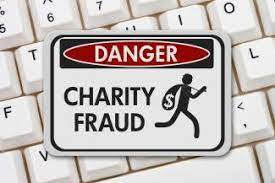
Understanding Charity Fraud: What You Need to Know
Charity fraud is a severe problem that can have devastating consequences for donors and the charities they support. Fraudulent charities often use emotional appeals to make fraudulent solicitations for donations and prey on people’s goodwill and desire to help others. Here are some links to some essential tips and links to things you need to know to protect yourself from charity fraud:
- Do Your Research: Before donating to any charity, research to ensure it is a legitimate organization. You can check its registration status, financial information, and reputation on websites such as Charity Navigator, GuideStar, or the Better Business Bureau.
- Be Wary of Emotional Appeals: Fraudulent charities often use emotional appeals, such as images of sick children or animals, to tug at people’s heartstrings and solicit donations. While it’s essential to be compassionate and caring, it’s also necessary to use your head and do your due diligence.
- Don’t Give Cash: Never give cash donations, as they are difficult to trace and can be easily stolen or misused. Instead, use a credit card, check, or online payment platform that provides a record of your donation.
- Verify the Charity’s Identity: Be wary of unsolicited emails, phone calls, or social media messages that ask for donations. If you receive a request, verify the charity’s identity and legitimacy before donating.
- Be Careful Where You Click: Fraudulent charities may use fake websites, social media accounts, or phishing scams to trick people into donating. So be careful where you click, and always verify the URL and website address before entering personal or financial information.
By following these simple guidelines, you can protect yourself from charity fraud and scams and ensure that your donations go to legitimate and deserving charities, organizations, businesses, organizations, and groups that positively impact society. Together, we can make a difference and help those in need without falling victim to scams and fraudulent schemes.
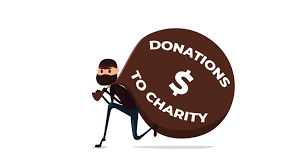
How to Report Charity Fraud
If you suspect a charity is fraudulent or engaged in unethical practices to raise money, it’s essential to report it to and contact the proper authorities. Here’s how to say charity fraud:
- Contact the Charity: If you have concerns about a charity, contact the organization directly and ask for clarification or more information. If the charity is legitimate, they should happily provide you with any information you need.
- Report to Government Agencies: You can report suspected charity fraud to various government agencies, such as the Federal Trade Commission, the Internal Revenue Service, or the Attorney General’s office in your state. These agencies can investigate and take legal action against fraudulent charities.
- File a Complaint: You can also file a complaint with the Better Business Bureau, Charity Navigator, or other watchdog organizations that monitor charities and report on their practices.
- Contact the Media: If you believe that a charity is engaging in fraudulent or unethical practices, you can contact the media and share your concerns. This can help raise awareness and pressure the charity to change its practices.
Taking action is essential if you suspect a charity, organization, person, organization, or fund is engaged in fraud or unethical practices is essential. By reporting it to the proper authorities, you can help protect donors and ensure their contributions go to legitimate and deserving charities and groups that positively impact society.
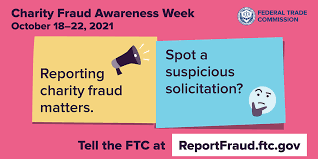
Conclusion
Charity fraud is a severe crime that can harm both individuals and legitimate charities. To protect yourself from charity fraud, research charities before donating money, verify the information before your money to granting, use secure websites, and be wary of high-pressure tactics. If you suspect charity fraud, you should report it immediately to the relevant authorities. By being vigilant and informed about charitable giving, you can protect yourself from scams and ensure that your donations go to legitimate charities and groups that positively impact society.
CoopBusiness is a revolutionary cooperative business-building platform that empowers individuals to become entrepreneurs, business owners, and financially independent.
As a member, you’ll receive top-level business mentorship, access to our proprietary business systems, and the opportunity to access the funds you want to turn your business ideas into reality.